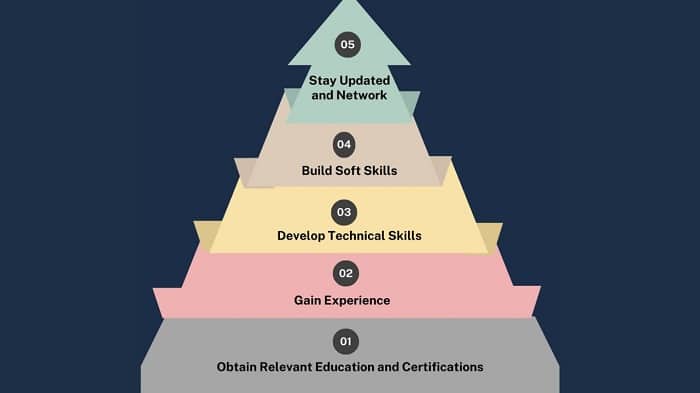”Globally, 90% of enterprises will use multi-cloud or hybrid cloud solutions by 2025”. Are these stats exciting for you? This rapid growth of cloud technologies presents unprecedented cybersecurity opportunities and risks. This digital transformation depends on aspiring Cloud Security Engineers like you.
In today’s interconnected world, cloud infrastructure security professionals are more critical than ever when data is the lifeblood of organisations. Becoming a Cloud Security Engineer offers adventure and responsibility, whether you want to outplay cyber adversaries or protect sensitive data. If you are a professional with CCSP Certification and knowledgeable about, CCSP Domains take advantage of this opportunity. Let’s embark on this journey together and confidently guard against tomorrow’s cyber threats.
Table Of Contents
- Understanding the Role of a Cloud Security Engineer
- Steps to Become a Cloud Security Engineer
- Advantages of Becoming a Cloud Security Engineer
- Conclusion
Understanding the Role of a Cloud Security Engineer
Cloud Security Engineers develop, implement, and maintain cloud systems and data security. Their role spans across various domains, aligning closely with the Certified Cloud Security Professional (CCSP) certification domains:
Cloud Security Architecture
Cloud security engineers provide secure architectures that work with cloud services. This requires knowing public, private, and hybrid cloud deployment strategies and scalable security.
Cloud Data Security
Data security in cloud environments is crucial. Cloud Security Engineers use encryption, access limits, and data masking for sensitive data.
Cloud Platform and Infrastructure Security
Monitoring and proactive security measures are needed to protect cloud platforms and infrastructure. Unauthorised access, malware, and insider threats can occur.
Risk and Compliance
The role requires managing cloud deployment risk and compliance while adhering to GDPR, HIPAA, and industry standards.
Security Operations
This includes monitoring, detecting, and responding to security incidents in real time. This helps to reduce cloud service and user risk.
Steps to Become a Cloud Security Engineer

Step 1: Obtain Relevant Education and Certifications
Start with a bachelor’s degree in computer science, IT, cybersecurity, or a similar discipline. Enhance your education with certificates like Certified Cloud Security Professional and Certified Information Systems Security Professional.
Step 2: Gain Experience
IT security and cloud computing internships, entry-level jobs, and volunteer opportunities provide valuable experience. Work with AWS, Azure, or Google Cloud to learn their security features and best practices.
Step 3: Develop Technical Skills
Master crucial technical skills like:
Cloud Security Tools
Learn about cloud security monitoring, configuration management, and vulnerability assessment tools like AWS Inspector and Azure Security Centre.
Scripting and Automation
Python, PowerShell, Terraform, and Ansible can simplify and improve security tasks.
Step 4: Build Soft Skills
Cloud security engineers need good communication, problem-solving, and cooperation abilities. You’ll collaborate with developers, IT operations, and compliance officers to secure and fix challenges.
Step 5: Stay Updated and Network
Cybersecurity evolves with new threats and technologies. To stay current on industry trends, attend conferences and join professional organisations. Networking with peers to learn about career prospects is also important.
Advantages of Becoming a Cloud Security Engineer
High Demand and Job Security
Cloud security experts are increasingly needed to protect private data and infrastructure as fast adoption of cloud technology spans many sectors, guaranteeing high job security and prospects in this profession. Companies are increasingly looking for qualified experts to manage the complexity of cloud security.
Competitive Salaries
Because of the specialised knowledge and abilities needed for the position, cloud security experts demand competitive pay. Given the importance of protecting cloud environments, businesses are ready to provide competitive pay packages, including incentives and benefits, to attract and keep top talent in this vital sector.
Remote Work Opportunities
Many cloud security engineering roles give professionals the freedom of remote work, enabling them to preserve a better work-life balance and operate from anywhere in the world. This adaptability not only improves job happiness but also creates worldwide employment possibilities, allowing experts to collaborate with other teams and companies wherever they are.
Impactful and Rewarding Work
Cloud security experts’ work is very valuable since they help companies avoid data breaches and cyberattacks. These experts support the general safety of digital assets by guaranteeing the security and integrity of cloud environments, attesting to their own accomplishments and personal satisfaction in knowing that their efforts help protect priceless data and build confidence in digital systems.
Conclusion
Cloud security engineering is an exciting career that requires constant learning, adaptation, and dedication to cloud data security. Following the procedures above and obtaining CCSP certification will help you secure the future of cloud computing. A bright and enjoyable career awaits skilled Cloud Security Engineers, whether you’re starting or advancing.
Ready to shape cloud security’s future? Start today to become a successful Cloud Security Engineer with Could Security courses offered by The Knowledge Academy.





